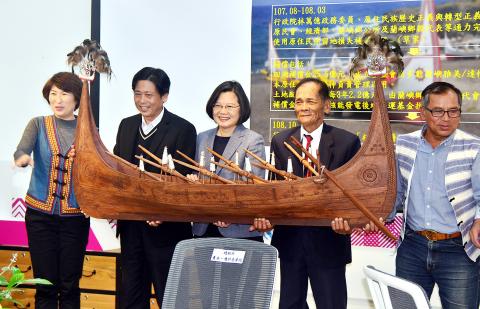The Ministry of Economic Affairs yesterday announced that the Tao community of Orchid Island (Lanyu, 蘭嶼) would receive NT$2.55 billion (US$83.6 million) in compensation after a government investigation found that they were unaware of plans to create the Lanyu nuclear waste disposal facility.
Ministry officials made the announcement at a news conference in Taitung attended by President Tsai Ing-wen (蔡英文).
The investigation “discovered the truth” and the compensation fulfills part of the government’s Aboriginal transitional justice project, Tsai said.

Photo: CNA
Tsai in 2016 instructed Minister Without Portfolio Lin Wan-i (林萬億) to launch the investigation after receiving a complaint from Lanyu residents.
The probe found that the Tao community was not notified that the government was planning to establish the facility, the ministry said.
The compensation is to be disbursed under the Regulations on Development and Management of the Lands Reserved for Indigenous People (原住民保留地開發管理辦法), it said.
The funds would not be provided all at once, but rather in annual installments of NT$25 million, it added.
Lanyu Township Mayor Chiaman Chialamu said that residents were happy to hear the decision.
“Out of all the presidents who have visited Lanyu, only President Tsai listened,” Chiaman said.
However, he said that while the compensation is welcome, the nuclear waste must be removed from the island.
The township would select a board to oversee a foundation governing the funds, Chiaman said, adding that their use would require majority approval by residents.
Separately yesterday, Executive Yuan spokeswoman Kolas Yotaka said that “today’s compensation has historic meaning for both the Executive Yuan and Lanyu.”
It is the first step toward finding historical truth and compensating Lanyu residents, she said.
The Executive Yuan yesterday exhibited declassified documents showing that in the 1970s, then-premiers Chiang Ching-kuo (蔣經國) and Sun Yun-hsuan (孫運璿) approved plans to build the facility and store nuclear waste on Lanyu without residents’ consent.
Additional reporting by Huang Pei-chun

DAREDEVIL: Honnold said it had always been a dream of his to climb Taipei 101, while a Netflix producer said the skyscraper was ‘a real icon of this country’ US climber Alex Honnold yesterday took on Taiwan’s tallest building, becoming the first person to scale Taipei 101 without a rope, harness or safety net. Hundreds of spectators gathered at the base of the 101-story skyscraper to watch Honnold, 40, embark on his daredevil feat, which was also broadcast live on Netflix. Dressed in a red T-shirt and yellow custom-made climbing shoes, Honnold swiftly moved up the southeast face of the glass and steel building. At one point, he stepped onto a platform midway up to wave down at fans and onlookers who were taking photos. People watching from inside

A Vietnamese migrant worker yesterday won NT$12 million (US$379,627) on a Lunar New Year scratch card in Kaohsiung as part of Taiwan Lottery Co’s (台灣彩券) “NT$12 Million Grand Fortune” (1200萬大吉利) game. The man was the first top-prize winner of the new game launched on Jan. 6 to mark the Lunar New Year. Three Vietnamese migrant workers visited a Taiwan Lottery shop on Xinyue Street in Kaohsiung’s Gangshan District (崗山), a store representative said. The player bought multiple tickets and, after winning nothing, held the final lottery ticket in one hand and rubbed the store’s statue of the Maitreya Buddha’s belly with the other,

‘NATO-PLUS’: ‘Our strategic partners in the Indo-Pacific are facing increasing aggression by the Chinese Communist Party,’ US Representative Rob Wittman said The US House of Representatives on Monday released its version of the Consolidated Appropriations Act, which includes US$1.15 billion to support security cooperation with Taiwan. The omnibus act, covering US$1.2 trillion of spending, allocates US$1 billion for the Taiwan Security Cooperation Initiative, as well as US$150 million for the replacement of defense articles and reimbursement of defense services provided to Taiwan. The fund allocations were based on the US National Defense Authorization Act for fiscal 2026 that was passed by the US Congress last month and authorized up to US$1 billion to the US Defense Security Cooperation Agency in support of the

‘COMMITTED TO DETERRENCE’: Washington would stand by its allies, but it can only help as much as countries help themselves, Raymond Greene said The US is committed to deterrence in the first island chain, but it should not bear the burden alone, as “freedom is not free,” American Institute in Taiwan Director Raymond Greene said in a speech at the Institute for National Defense and Security Research’s “Strengthening Resilience: Defense as the Engine of Development” seminar in Taipei yesterday. In the speech, titled “Investing Together and a Secure and Prosperous Future,” Greene highlighted the contributions of US President Donald Trump’s administration to Taiwan’s defense efforts, including the establishment of supply chains for drones and autonomous systems, offers of security assistance and the expansion of